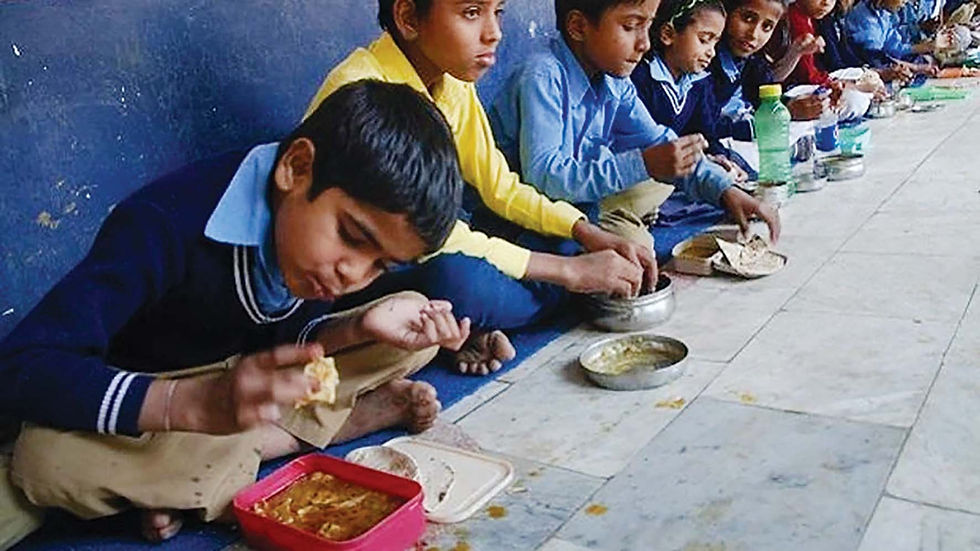Hunger Games
- Kuldeep Ambekar

- Aug 7, 2025
- 3 min read
In India’s education capital, one quickly learns that books are not enough to feed the mind.

When I first arrived in Pune, often hailed as the ‘Oxford of the East,’ I believed I had finally found my gateway to knowledge and opportunity. I had come here like so many others from small towns and modest homes, dreaming of degrees and a better life. What I did not expect was to confront hunger as my fiercest rival.
Education is supposed to be a battle of ideas, but I found myself in a more primitive fight: one for two square meals a day. I learned quickly that it is difficult, nay, nearly impossible, to focus on lectures, assignments, or exams when your stomach growls louder than the professor. How can the brain retain knowledge when the body is weak? How does one dream big on an empty stomach?
This quiet, gnawing crisis lodged itself deeply in my heart. And in 2018, with more conviction than resources, I founded an organisation called Student Helping Hands. It was born not from academic theory, but lived experience. Our flagship initiative is something I call the ‘Food Scholarship.’
You may never have heard of such a scholarship because it doesn’t pay for books, tuition fees, or shiny gadgets. It offers something even more foundational: two hot, nutritious meals a day. That’s it. Yet it has proven to be life-altering.
Each plate of food we serve is a vote of confidence in someone’s potential. It is a meal with meaning. A student who eats well can think clearly, sleep better, and walk into an exam hall with confidence rather than dizziness.
Today, our organisation is in its eighth year. What began as a personal struggle has grown into a movement. We cater to students who are orphaned, disabled, from single-parent families, or economically disadvantaged - often all at once. Our meals are funded not by corporations or governments, but by ordinary people who choose to donate from their limited means. Perhaps that is why the giving feels so profound because it comes from those who understand deprivation.
This year alone, over 1,000 applications came in. We conduct interviews because the need is overwhelming and the resources are limited. The stories are heartbreaking. Some students survive on a single box of khichdi split between two meals. Some manage with just vada pav and water. A few fall sick, not from infection but from prolonged starvation.
Last year, we conducted a health survey. What we found was alarming but not surprising: over 40 percent of the girls and nearly a quarter of the boys were anaemic. And yet, they dream of changing the world, becoming doctors, engineers, civil servants. They prepare for UPSC exams by day and go to bed hungry at night. Their courage humbles me.
But here is the truth: we cannot help everyone. Some days, I have to look into the eyes of a deserving student and say no. Not because they lack merit but because we’ve already given all we can. Those are the hardest moments. Sometimes they cry. Sometimes I do, too.
Many people find it hard to believe that students go hungry in Pune, a city known for education and prosperity. I invite them to walk with me and visit the cramped hostels and the shared tiffins. This is not melodrama but the quiet tragedy that hides behind rising enrolment figures and glowing academic rankings.
The government has long recognised the link between nutrition and learning for schoolchildren. But support evaporates the moment one steps into college. For teenagers and young adults, hunger is no longer considered a policy priority.
That’s where we step in. Not as saviours, but as fellow travellers who know what it feels like to juggle ambition and adversity. Our donors are not millionaires. They are vegetable vendors, clerks and pensioners - people who know the value of a meal because they have struggled for one themselves.
Our Food Scholarship is not a charity. It is a correction. Call it a refusal to let someone’s dreams be derailed by something as solvable as hunger.
Education policy in India is obsessed with digital infrastructure, smart classrooms and employability. But I’ve learned that the most powerful tool for student success might just be a plate of rice and dal. So, I say this as someone who once lived this story: give a meal, and you give a mind the strength to think. That is a scholarship worth investing in.
(The writer is a lawyer and president, Student Helping Hands. Views personal.)





Comments